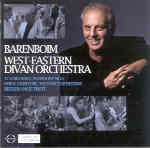I think it’s a shame that the selling point for this new recording will not be the fact that it’s a fine performance of Tchaikovsky’s Fifth Symphony (the repertoire gets distinctly second billing on the album cover, after the performers). If the purpose of this project is to show how theoretically higher cultural values trump mere politics, then it must be accounted a failure, and a classic example of the world of illusion in which today’s artists and academics live. Here we have a select group of rigorously screened, carefully auditioned, elite musicians from a bunch of countries that nominally hate each other. All are talented, well-trained, and would leap at the opportunity to work with major artists such as Barenboim and his colleagues (Yo-Yo Ma also was involved, somehow predictably). The fact that these players may dislike each other politically is irrelevant. They are expected to act professionally, to behave themselves, and to work together, because this is what (even would-be) professional musicians do.
Beyond that, artists never need excuses such as international politics to hate each other: the infighting and back-stabbing that goes on in regular orchestras is the stuff of legend. Nor do they need much encouragement to place self-interest above nationalism, religion, or other similar philosophical constructs. And this inherent opportunism isn’t always a bad thing. So why should this group be any different, or any more special? It isn’t. If Barenboim and the late Edward Said, who participated in this initiative, believe that they are “making a difference” by spending someone’s fortune to bring this group together to play classical music instead of, say, funding a hospital, a school, an athletic program, or working with the poor and homeless, then so be it. But let’s not kid ourselves about the significance of the political dimension, nor be amazed that a group of gifted youngsters can turn in a largely excellent performance of Tchaikovsky’s Fifth Symphony. We should expect no less, particularly if the results are going to be offered to the public for sale on their artistic merits.
As for Barenboim, he recorded for Warner a pretty dull performance not too long ago of this symphony, with his own band in Chicago. While I have never subscribed to the theory that he has positioned himself as a sort of “Furtwängler clone”, interpretively speaking, this recording is so much more interesting than the earlier one that I can’t help but note one apparent similarity: both conductors do some of their best work under politically adverse conditions (whether real or, as here, artificially created for the purpose). Can it be, ironically, that it is only a highly charged political situation, combined with the need to believe that their efforts have some important wider cultural significance, that gets their musical juices flowing? It’s interesting to speculate, based on the evidence of Barenboim’s recordings. In any case, he is at the top of his form here.
Tempos are generally lively (note the introductions to the first and last movements), and while Barenboim seldom indulges in excessive rubato or affected ritards, there are countless details of phrasing and articulation that prove quite effective. Consider, for example, the way the violins phrase the principal theme of the opening allegro, with those nice, romantic touches of portamento. Other decisions are a bit less successful. The dynamic adjustments in the brass at the finale’s central appearance of the motto theme (with those rushing scales) simply make the players sound weak-toned.
Indeed, as with so many pick-up ensembles comprised largely of youngsters, the winds and brass turn out to be the group’s Achilles’ heel, if it can be said to have one. It’s clear that Barenboim spent most of the rehearsal time working with the strings: their passion in the andante and elegance in the third-movement waltz are impressive, but the horns and woodwinds often fail to penetrate as they should. It’s partly a question of confidence. The first desk players are admirably accurate but not always as timbrally alluring or bold as they could be (particularly in the andante and the finale). I also find the heavy legato and thick textures, combined with a slightly casual approach to rhythm, a touch “Germanic” for this music. On the other hand, there’s no questioning Barenboim’s ability to turn these players into an ensemble capable of realizing his personal vision of the work, and the finale’s coda really is thrilling.
So the result is an exciting performance in the main, very well recorded, with details here and there pointing to an enthusiastic orchestra of less than world-class. Certainly the musicians have every right to be proud of their achievement, but in the world of recordings the competition in this music is fierce, and the presence of appealing performances of the Forza del destino Overture and Valse triste adds nothing of significance. Nor, for me anyway, does the inclusion of a bonus DVD about this live Geneva concert, which I did not watch. As I said, it’s the music that matters, or ought to. If you are looking for yet another Tchaikovsky Fifth, one that really does show Barenboim at his best in the work, then I can recommend this recording on that basis. I couldn’t care less who is playing, only how well. But I still wonder: why didn’t he deliver a performance this good in Chicago?
































